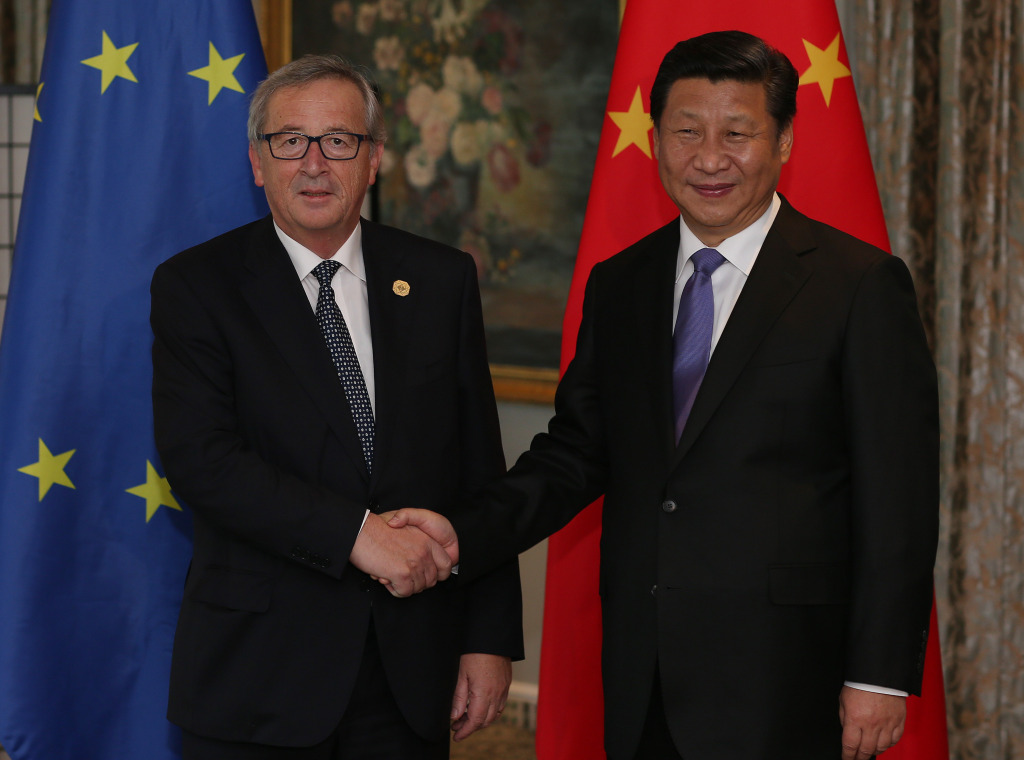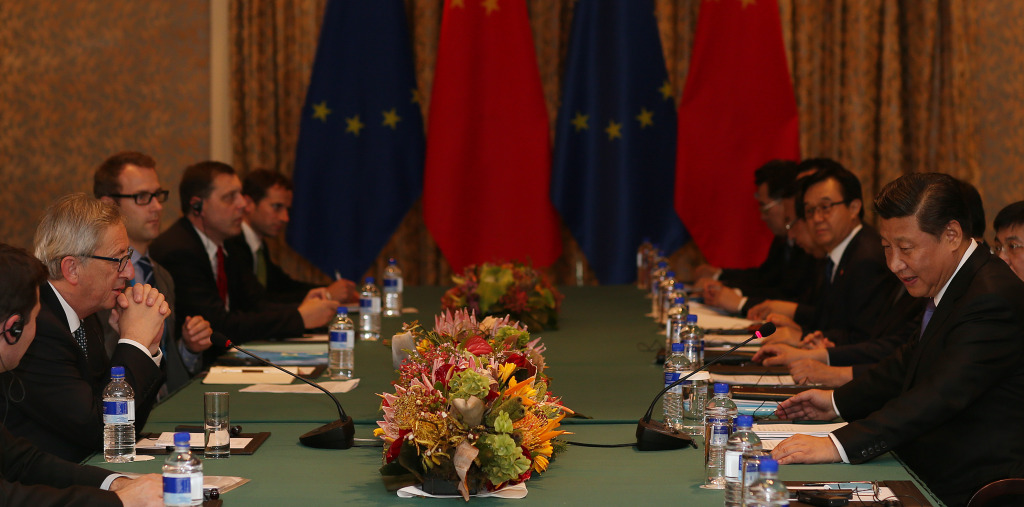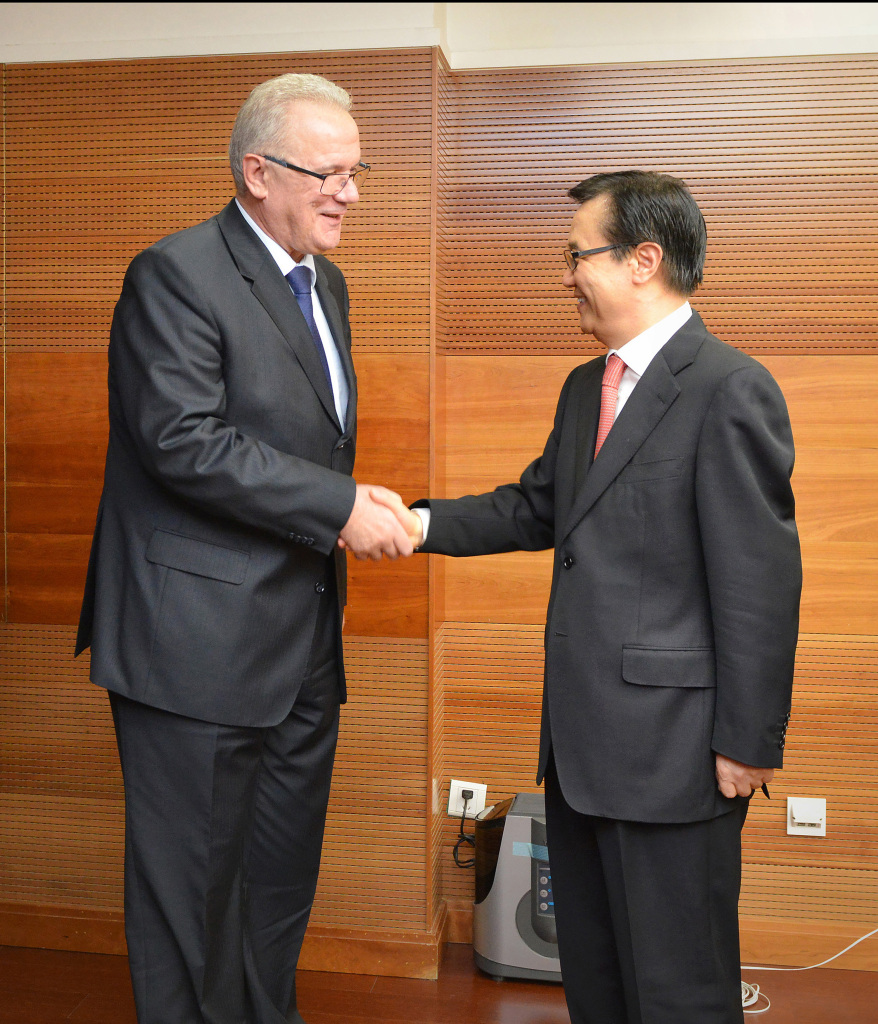It’s time for a re-set of the European Union’s (EU’s) messy and frequently mismanaged relations with China. The arrival of a new top team in Brussels provides the opportunity. Recent developments in Beijing make seizing it both an imperative and a test of the EU’s capacity to wield influence beyond its own borders, says Guy de Jonquières, Senior Fellow at the European Centre for International Political Economy.
After three decades of studiously keeping a low international profile, China has emerged since 2009 as a steadily more forceful, ambitious—and sometimes disruptive—player on the global stage. That shift has sharply accelerated since Xi Jinping became president. Rapidly accumulating more personal power than any leader since Deng Xiaoping, in barely two years he has stamped his imprint deeply on both foreign and domestic policy.
Vowing to engineer the ‘great rejuvenation of the Chinese nation’, Mr Xi has set out to restore the country’s past glory and match its economic weight with diplomatic muscle. He has launched a flurry of initiatives, including a strategically important energy deal with Russia, a development bank for Asia and a ‘New Silk Road’ project to integrate China economically with central Asia and, ultimately, Europe, while simultaneously stepping up Beijing’s controversial claims to supremacy in the South China Sea.
He has coupled those expansionary moves with a pragmatic instinct for tactical compromise and cooperation, exemplified by his and United States (US) president Barack Obama’s surprise joint declaration on climate change at November’s APEC summit in Beijing. He has also sought to ease, at least temporarily, strained relations with China’s anxious and mistrustful neighbours through talks with Shinzo Abe, Japan’s prime minister, and a charm offensive in South and Southeast Asia.
Mr Xi, then, gives every appearance of a man who means business, with a bold agenda to match. But how should the EU, or, indeed, the rest of the world, seek to do business with him? China’s political and policy-making system, equalling the EU’s in complexity and surpassing it in opacity, its sometimes unpredictable behaviour and its acute sense of national exceptionalism have long made dealing with it a challenge. But never has doing so been more important than now.
The EU should start by holding up a mirror to itself. China is well practised at sizing up partners and adversaries, assessing their strengths and adeptly exploiting their weaknesses to its advantage. It also prizes nothing in international relations so as much as power and strength and those who possess them. Its attitude was captured in the bald statement by Yang Jiechi, its last foreign minister, that, “China is a big country and other countries are small countries, and that’s just a fact.”
By that measure, Europe does not cut an impressive figure. Not only does it lack the hard power, unified foreign policy, entrepreneurial dynamism and strategic presence in Asia that have earned the US respect—albeit grudging and fast dwindling—in Beijing. Today, Europe also presents an image to the world of an economically stagnant region, beset by internal divisions and lacking confidence, drive and coherent direction – Pope Francis’s comparison with a haggard and barren grandmother stung because it was so painfully close to the truth.
If the EU is to persuade China to take it seriously, it needs quickly to set about getting its own house in order. That means, first of all, acting decisively to clean up the Eurozone mess (in which China, as a large investor in Europe, has a substantial stake), regaining economic vitality and generating sustained growth. Unless it does so, its efforts to look outwards will be constantly overshadowed and side-tracked by preoccupations at home, steadily diminishing its international political relevance.
Equally important, the EU must learn to speak to China with one voice. It has never found that easy. Time and again—over the post-Tiananamen arms embargo, the textiles imports ‘bra wars’, and the ill-starred anti-dumping case against Chinese solar panels—the EU’s efforts to forge a united front towards Beijing have stumbled or foundered on petty rivalries and squabbles in its own ranks.
These stem, in large part, from member governments’ efforts to achieve an edge over each other by competing for favours from Beijing, usually in the form of commercial or financial gain. That may earn them rewards in the short term, such as Chinese export orders or promises of inward investment, which win vote-hungry politicians popularity at home. But longer term, such toadying mercantilism undermines both the moral authority of their foreign policies and their standing in Beijing by showing how easily and cheaply they can be bought off.
The willingness, indeed eagerness, of even the most powerful European governments to play that game has not only muted their once outspoken criticism of Chinese policies on issues such as human rights and Tibet; it has been an open invitation to Beijing to pursue divide-and-rule tactics and get its way by bypassing the EU’s institutions and dealing with its members bilaterally, like so many tributary states.
If that is to change the EU needs to define its priorities carefully and focus its energy where it can exert maximum leverage. The most obvious area is trade and investment policy. That is the foreign policy field in which the treaties endow it with the greatest muscle. It is also the one in which China has the keenest interest and is currently, in several respects, demandeur.
Last spring, Mr Xi became the first Chinese president to visit the European Commission, spending three whole days in Brussels. Though the trip yielded little of substance, it was evidently intended to send diplomatic signals. Perhaps the most important was to telegraph China’s unease and suspicions about its dealings with the US, triggered in part by the 2008 financial crisis, and to show Washington that, in the new multipolar world, Beijing had alternatives to simply complying with a US-centric international order.
That impression was reinforced by the extraordinary effort expended by Mr Xi’s team to persuade his reluctant hosts to agree to mention in the joint communiqué the possibility of a future EU-China free trade agreement (FTA). Beijing’s thinking appears to have been influenced by the worldwide growth of preferential trade deals and particularly by the US-led Trans-Pacific Partnership, from which China is excluded and which it fears is intended to ‘contain’ it.
An EU-China FTA is, at best, a long-term prospect. The more pressing priority is to conclude recently-launched negotiations on a bilateral investment agreement (BIA). Here, too, China has a stake in its success. Its companies are increasingly looking overseas to acquire the technology, management know-how, marketing expertise and brands that they need to grow profitably. At the same time, Beijing is keen to diversify its roughly USD 4 trillion of foreign exchange reserves away from low-yielding paper securities and natural resources into more productive industrial and commercial assets.
On both scores Europe has much to offer, especially as China’s investments there encounter a warmer welcome and arouse less political suspicion than in the US. Nonetheless, Beijing is nervous. It worries about triggering, sooner or later, a political backlash that could prompt Europe to follow the US example by subjecting planned Chinese investments to official screening and controls.
Although no serious moves are afoot in the EU to do so, Beijing wants insurance in the form of statutory investment protection backed by investor-state dispute settlement (ISDS) procedures. These are still controversial in the EU. However, Beijing’s demand gives Brussels leverage in pressing for provisions in the BIA that would guarantee better access for and fairer treatment of European companies in China, which increasingly complain that they are victims of capricious regulation and discrimination there.
To negotiate effectively, the EU needs something else as well. Beijing’s diplomacy is highly transactional in nature and the respect it accords foreign counterparts and adversaries depends heavily on their ability to bargain hard and get results. The EU can best establish its credentials by concluding swiftly its pending negotiations with Canada on an FTA and with the US on the Transatlantic Trade and Investment Partnership. Failure to clinch those deals with close allies would be a major setback that would risk seriously undermining the credibility of EU efforts to forge new relations with China.
There is also scope for beneficial Sino-European cooperation beyond the sphere of trade and investment. However, efforts need to be much more sharply focused than in the past. The EU and China have more than 70 ‘sectoral dialogues’ on a diverse array of issues ranging from agriculture to textiles trade. But it is hard to say what, if anything, of substance these talking shops have produced: many seem to be more successful at conference-building than confidence-building.
To engage effectively with China, the rest of the world has to be able to offer things that China values and wants. Only then will China be disposed to listen and to reciprocate seriously. And China’s wants are dictated primarily by its most pressing national needs and those of its ruling Communist Party. In few other countries does foreign policy grow so directly out of domestic politics.
As a result foreign attempts to pressure China into acting against its will face an uphill struggle that may ultimately be counter-productive. But it also means that progress can be made on those issues that China has identified as clearly serving its own interests. Those are where the EU should concentrate its attention.
There are several promising avenues for mutually beneficial cooperation. One is in combating the spread of the ebola virus, which is causing Beijing increasing alarm; another is containing Islamic insurgency, a constant threat in China’s border regions that deeply troubles its stability-fixated rulers; a third is the environment and climate change – rising popular anger about chronic pollution has rapidly propelled these concerns up China’s political agenda.
In all these areas both sides have potentially much to gain. The EU should be ready to take the lead in exploring the opportunities for working more closely with Beijing. However, it needs to do so with its eyes open. China often talks of ‘win-win’ outcomes. In practice, other countries have often found that that means big wins for China and much smaller wins, or even losses, for everyone else. That is not the basis for balanced and sustainable international relationships.
China is a tough customer. It can also be a difficult and disruptive one. Mr Xi’s vision for its future development is not one the rest of the world will necessarily find easy to accept or live with. Though he appears, at least for the moment, to be firmly in charge, China is still struggling to define a smooth path for integrating itself with the global order. Meanwhile, the tethering of its foreign policy to domestic politics—at a time when it faces mounting economic and social challenges at home—means that any domestic upheavals will send tremors reverberating through its international relations, as they have done repeatedly in the past.
None of these factors should deter the EU from seeking to engage more deeply and constructively with China. On the contrary, China’s rise compels it to do so. But while talking softly, Europe would do well to ensure that it is listened to by speaking coherently with one voice and carrying at least a medium-sized stick.
The European Centre for International Political Economy (ECIPE) is a world-economy think tank based in Brussels, www.ecipe.org.
This article was previously published as an ECIPE Policy Brief.







the connexion future between Europe and China is railroad transporting.
best regards,
gregor m. schmid